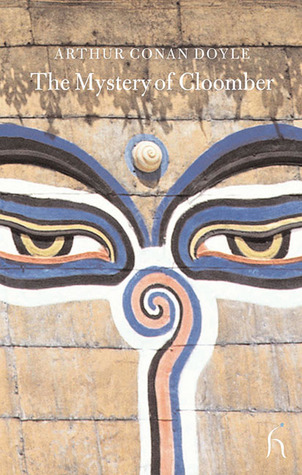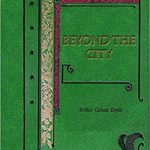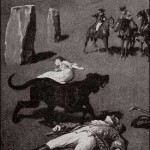If I had any personal soreness on account of this family snub, it was a very passing emotion, and one which was soon effaced from my mind.

It chanced that on the very next day after the episode I had occasion to pass that way, and stopped to have another look at the obnoxious placard. I was standing staring at it and wondering what could have induced our neighbours to take such an outrageous step, when I became suddenly aware of a sweet, girlish face which peeped out at me from between the bars of the gate, and of a white hand which eagerly beckoned me to approach. As I advanced to her I saw that it was the same young lady whom I had seen in the carriage.
“Mr. West,” she said, in a quick whisper, glancing from side to side as she spoke in a nervous, hasty manner, “I wish to apologise to you for the indignity to which you and your family were subjected yesterday. My brother was in the avenue and saw it all, but he is powerless to interfere. I assure you, Mr. West, that if that hateful thing,” pointing up at the placard, “has given you any annoyance, it has given my brother and myself far more.”
“Why, Miss Heatherstone,” said I, putting the matter off with a laugh, “Britain is a free country, and if a man chooses to warn off visitors from his premises there is no reason why he should not.”
“It is nothing less than brutal,” she broke out, with a petulant stamp of the foot. “To think that your sister, too, should have such a unprovoked insult offered to her! I am ready to sink with shame at the very thought.”
“Pray do not give yourself one moment’s uneasiness upon the subject,” said I earnestly, for I was grieved at her evident distress. “I am sure that your father has some reason unknown to us for taking this step.”
“Heaven knows he has!” she answered, with ineffable sadness in her voice, “and yet I think it would be more manly to face a danger than to fly from it. However, he knows best, and it is impossible for us to judge. But who is this?” she exclaimed, anxiously, peering up the dark avenue. “Oh, it is my brother Mordaunt. Mordaunt,” she said, as the young man approached us. “I have been apologising to Mr. West for what happened yesterday, in your name as well as my own.”
“I am very, very glad to have the opportunity of doing it in person,” said he courteously. “I only wish that I could see your sister and your father as well as yourself, to tell them how sorry I am. I think you had better run up to the house, little one, for it’s getting near tiffin-time. No—don’t you go Mr. West. I want to have a word with you.”
Miss Heatherstone waved her hand to me with a bright smile, and tripped up the avenue, while her brother unbolted the gate, and, passing through, closed it again, locking it upon the outside.
“I’ll have a stroll down the road with you, if you have no objection. Have a manilla.” He drew a couple of cheroots from his pocket and handed one to me. “You’ll find they are not bad,” he said. “I became a connoisseur in tobacco when I was in India. I hope I am not interfering with your business in coming along with you?”
“Not at all,” I answered “I am very glad to have your company.”
“I’ll tell you a secret,” said my companion. “This is the first time that I have been outside the grounds since we have been down here.”
“And your sister?”
“She has never been out, either,” he answered. “I have given the governor the slip to-day, but he wouldn’t half like it if he knew. It’s a whim of his that we should keep ourselves entirely to ourselves. At least, some people would call it a whim, for my own part I have reason to believe that he has solid grounds for all that he does—though perhaps in this matter he may be a little too exacting.”
“You must surely find it very lonely,” said I. “Couldn’t you manage to slip down at times and have a smoke with me? That house over yonder is Branksome.”
“Indeed, you are very kind,” he answered, with sparkling eyes. “I should dearly like to run over now and again. With the exception of Israel Stakes, our old coachman and gardener, I have not a soul that I can speak to.”
“And your sister—she must feel it even more,” said I, thinking in my heart that my new acquaintance made rather too much of his own troubles and too little of those of his companion.
“Yes; poor Gabriel feels it, no doubt,” he answered carelessly, “but it’s a more unnatural thing for a young man of my age to be cooped up in this way than for a woman. Look at me, now. I am three-and-twenty next March, and yet I have never been to a university, nor to a school for that matter. I am as complete an ignoramus as any of these clodhoppers. It seems strange to you, no doubt, and yet it is so. Now, don’t you think I deserve a better fate?”
He stopped as he spoke, and faced round to me, throwing his palms forward in appeal.
As I looked at him, with the sun shining upon his face, he certainly did seem a strange bird to be cooped up in such a cage. Tall and muscular, with a keen, dark face, and sharp, finely cut features, he might have stepped out of a canvas of Murillo or Velasquez. There were latent energy and power in his firm-set mouth, his square eyebrows, and the whole pose of his elastic, well-knit figure.
“There is the learning to be got from books and the learning to be got from experience,” said I sententiously. “If you have less of your share of the one, perhaps you have more of the other. I cannot believe you have spent all your life in mere idleness and pleasure.”
“Pleasure!” he cried. “Pleasure! Look at this!” He pulled off his hat, and I saw that his black hair was all decked and dashed with streaks of grey. “Do you imagine that this came from pleasure?” he asked, with a bitter laugh.
“You must have had some great shock,” I said, astonished at the sight, “some terrible illness in your youth. Or perhaps it arises from a more chronic cause—a constant gnawing anxiety. I have known men as young as you whose hair was as grey.”
“Poor brutes!” he muttered. “I pity them.”
“If you can manage to slip down to Branksome at times,” I said, “perhaps you could bring Miss Heatherstone with you. I know that my father and my sister would be delighted to see her, and a change, if only for an hour or two, might do her good.”
“It would be rather hard for us both to get away together,” he answered, “However, if I see a chance I shall bring her down. It might be managed some afternoon perhaps, for the old man indulges in a siesta occasionally.”
We had reached the head of the winding lane which branches off from the high road and leads to the laird’s house, so my companion pulled up.
“I must go back,” he said abruptly, “or they will miss me. It’s very kind of you, West, to take this interest in us. I am very grateful to you, and so will Gabriel be when she hears of your kind invitation. It’s a real heaping of coals of fire after that infernal placard of my father’s.”
He shook my hand and set off down the road, but he came running after me presently, calling me to stop.
“I was just thinking,” he said, “that you must consider us a great mystery up there at Cloomber. I dare say you have come to look upon it as a private lunatic asylum, and I can’t blame you. If you are interested in the matter, I feel it is unfriendly upon my part not to satisfy your curiosity, but I have promised my father to be silent about it. And indeed if I were to tell you all that I know you might not be very much the wiser after all. I would have you understand this, however—that my father is as sane as you or I, and that he has very good reasons for living the life which he does. I may add that his wish to remain secluded does not arise from any unworthy or dishonourable motives, but merely from the instinct of self-preservation.”
“He is in danger, then?” I ejaculated.
“Yes; he is in constant danger.”
“But why does he not apply to the magistrates for protection?” I asked. “If he is afraid of any one, he has only to name him and they will bind him over to keep the peace.”
“My dear West,” said young Heatherstone, “the danger with which my father is threatened is one that cannot be averted by any human intervention. It is none the less very real, and possibly very imminent.”
“You don’t mean to assert that it is supernatural,” I said incredulously.
“Well, hardly that, either,” he answered with hesitation. “There,” he continued, “I have said rather more than I should, but I know that you will not abuse my confidence. Good-bye!”
He look to his heels and was soon out of sight round a curve in the country road.
A danger which was real and imminent, not to be averted by human means, and yet hardly supernatural—here was a conundrum indeed!
I had come to look upon the inhabitants of the Hall as mere eccentrics, but after what young Mordaunt Heatherstone had just told me, I could no longer doubt that some dark and sinister meaning underlay all their actions. The more I pondered over the problem, the more unanswerable did it appear, and yet I could not get the matter out of my thoughts.
The lonely, isolated Hall, and the strange, impending catastrophe which hung over its inmates, appealed forcibly to my imagination. All that evening, and late into the night, I sat moodily by the fire, pondering over what I had heard, and revolving in my mind the various incidents which might furnish me with some clue to the mystery.




